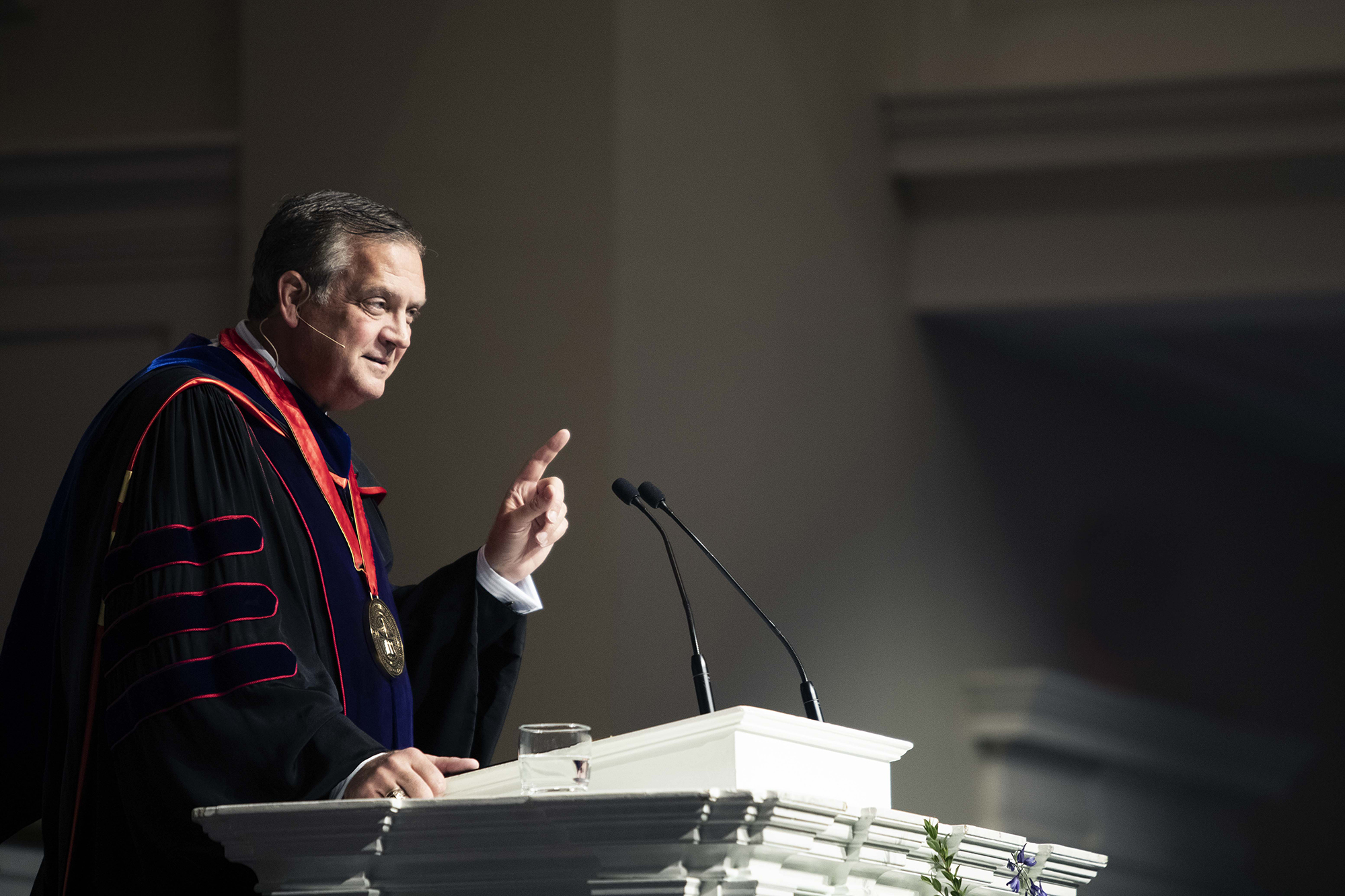 [1]
[1]Iorg cautions ‘Who do you follow?’ can be a divisive question
ONTARIO, Calif. (BP) — “Christian celebrity is an oxymoron,” Jeff Iorg, president of Gateway Seminary, said. “Those two words should never go together in a sentence.
 “Yet, too many of us emulate the worldly pattern of venerating Christian leaders, producing sectarianism, tribalism, denominational strife and church conflicts,” Iorg said Jan. 31 at Gateway’s main campus in Ontario, Calif., as classes opened for the spring semester
“Yet, too many of us emulate the worldly pattern of venerating Christian leaders, producing sectarianism, tribalism, denominational strife and church conflicts,” Iorg said Jan. 31 at Gateway’s main campus in Ontario, Calif., as classes opened for the spring semester
Iorg spoke on the topic “Christian Celebrities and Childish Followers” to students, faculty, staff and area pastors as well as a global live stream audience, challenging the Gateway community to mature in their relationship to popular leaders, learning from their example but not venerating them to the point of divisiveness.
Social media has codified Christian celebrity via the question, “Who do you follow?” Iorg said, warning that importing this worldly behavior into the Christian community can be detrimental. Speaking from 1 Corinthians 1:3-9, he said such behavior only seems new because of today’s technology, but it is an age-old problem.
“Some Christians behave in childish ways that signify immaturity,” he said. “Immature Christians relate to leaders in unhealthy ways.”
Iorg cited the apostle Paul’s description of immature behavior as being envious of popular leaders, leading to strife.
“Followers are jealous of the successes of some leaders and attack them for supposed fallacies in their approach,” he said. “Attempting to tear down others, we only denigrate ourselves. Immature Christians venerate leaders and create factions.”
Examples of the error of “I follow Paul” include division in order to find security in a group; categorizing people to establish a particular identity; and posturing to promote status.
Paul also wrote “on multiple occasions wrote ‘follow my example,'” Iorg said, noting that Christians follow a leader’s example by examining the whole of his or her life, learning from both strengths and weaknesses.
“Following the example of a leader in a healthy way requires observing the totality of a leader’s life, not the facade presented in social media,” he said. “We should learn from a leader’s shortcomings and successes.”
Iorg said a mark of maturing Christians is they relate to leaders in healthy ways. He pointed to verse 5 in 1 Corinthians 1, summarizing Paul’s counsel that leaders are servants, channels of the Gospel and appointed to their tasks by God.
“The Bible tells us God has the priority role in ministry success,” he said. “God is always the owner of a ministry, but we are His coworkers, His field, His building. He’s the one who produces ministry success.”
Maturing Christians also accept and value their secondary role in ministry, Iorg stated.
“We value our secondary role,” he said. “While it is a lesser role than God’s, it’s still a vital role.
“We serve God, not ourselves, and take care not to avoid role confusion.”
**********
Mohler distinguishes God’s ‘secret things’ from ‘things revealed’
LOUISVILLE, Ky. (BP) — God’s revelation about Himself through Scripture is the primary basis for all Christian knowledge and education, R. Albert Mohler Jr., president of Southern Baptist Theological Seminary, said at the Feb. 5 spring convocation.
 Mohler, in an address titled “The Things Revealed Belong to Us and to Our Children Forever,” preached from Deuteronomy 29:29, pointing out that Christians recognize two central tenets about human knowledge, both found in this verse:
Mohler, in an address titled “The Things Revealed Belong to Us and to Our Children Forever,” preached from Deuteronomy 29:29, pointing out that Christians recognize two central tenets about human knowledge, both found in this verse:
— Human beings cannot know everything — a realm of knowledge called the “secret things” that only God knows.
— Humans can know and treasure the things God has chosen to disclose to them — called the “things he has revealed” in Deuteronomy.
“What it means to be the body of Christ is that we are a scriptural people and that we are defined by the ‘things revealed,'” Mohler stated.
“Amongst the great joy of Christ’s people … in our singing, in our worship, in our preaching, in our conversation, in the ministry and missions of the church [is] the great confidence that ‘the things revealed belong to us,'” he said.
“We know how to tell people to come to Jesus,” he noted. “We know how to diagnose the human problem as sin. We know how to point people to the cross of the Lord Jesus Christ. We know how to tell the story of Jesus — conceived by the Holy Ghost, born of the Virgin Mary, suffered under Pontius Pilate, was crucified, dead and buried. We know how to point to the empty tomb.”
Mohler said all reality is divided into categorical distinctives, such as light and darkness and life and death, with one of the most important being the distinction between the “secret things” and the “things revealed” in Deuteronomy 29:29.
Modern culture does not concede this distinction, Mohler stated, as modern scientists and philosophers believe there are no such borders to human knowledge, and humankind could know everything if it had enough time and resources to explore.
Christians who affirm a biblical worldview, however, must not only admit these limitations but embrace them, he said.
“You can close your eyes at night because the ‘secret things’ belong to God. You can open your eyes in the morning because the ‘secret things’ belong to God,” Mohler said. “When the secular world can look at the world and see nothing but accident and randomness, you see the ‘secret things’ that belong to God. That is a tremendous comfort.”
Mohler said Christian theology has long observed two categories of revelation, or God’s disclosure about Himself to humankind: general revelation, i.e., knowledge about God observed in nature, and special revelation, i.e., knowledge about God observed through Scripture. As the apostle Paul explained in Romans 1, God has revealed in nature even His invisible attributes, so that human beings are without excuse in their sin. This includes a deeply ingrained sense of right and wrong, Mohler said, pointing out that in every culture a 2-year-old boy who does something wrong knows he must hide.
Human beings are saved only because of special revelation, Mohler said, citing the surrounding context of Deuteronomy 29 as making it clear that the “things revealed” are special revelation. And this special revelation is found in Holy Scripture, the existence of which is an act of divine love, he said.
“God has intended every word of Scripture for every one of us — that is really good news. This is God’s gift, this is grace,” Mohler said. “[The things revealed] don’t belong to a caste of us, they don’t belong to a few of us, and they are not given to a priestly order or a magisterium. [Deuteronomy teaches] ‘the things revealed belong to us.’ All of it.”
Drawing from the late Baptist theologian Carl F.H. Henry, Mohler said God’s self-disclosure is a forfeiture of “personal privacy” so that human beings might know Him. God could have created the entire world — and everyone in it — without revealing anything about Himself, but He chose not to do that, Mohler said. And that revelation should be treasured and passed on to the next generation, both through faithful Christian parenting and faithful Christian teaching, he said, describing Southern Seminary as a unique kind of institution because it takes the Bible seriously.
“What does this mean for us, The Southern Baptist Theological Seminary and Boyce College? It means that, without apology, the Holy Scriptures are what we believe,” Mohler said. “It means, without apology, that we are not trying — in any class, any endeavor, any course, in any way — to outgrow the Scriptures. We are completely dependent at every point upon the things revealed, and it is our responsibility … to make very clear the biblical nature of everything that is taught, tying it to the ultimate authority of Scripture.”
Audio and video of the convocation address are available at equip.sbts.edu.
